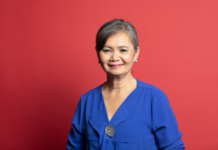By Mu Sochua
During Cambodia’s 2013 parliamentary elections, the Cambodian People’s Party (CPP), Cambodia’s ruling party since the fall of the Khmer Rouge in 1979, had no message for the country’s youth, who represent 70 per cent of the electorate.
The CPP relied entirely on state and private media as its propaganda machinery to communicate with the voters, betting that young people would follow their parents’ words of advice and keep the old ways unchallenged. But the CPP lost 22 seats in 2013, their worst political disaster in 30 years. In the meantime, the Cambodia National Rescue Party (CNRP), a merger of two opposition parties, was banned from state and private media. CNRP leader, Sam Rainsy, who was in self-exile in Paris after being sentenced in absentia for 30 years, sent his message and communicated with his party’s local leaders and the voters through Skype.
Hundreds of thousands of villagers could be seen gathered under mango or tamarind trees listening and communicating with Sam Rainsy despite threats and intimidation of all forms by the village chiefs and local police. Sam Rainsy’s message was short, clear and simple: Phdo! Change! If a young person wanted to be counted as cool, she or he needed to join the CNRP’s daily rally in the city or town. Students skipped classes and were seen in the streets with the opposition. They were creative. They were engaging. They brought a fresh air of hope. Cambodian women defied traditions and were seen riding motorcycles with men with iPhones in their hands. Cambodian migrant workers in Thailand, in South Korea or Japan called home every day to influence their parents’ votes. There was a sense of a society finally equal, finally coming out of fear. There was no violence but a loud and clear feeling of “Cambodia is our nation. We must rescue her.”
Every village was penetrated as news via social media spread. At every local coffee shop, every street corner, even every government office, young or old were glued to their iPhones, iPads and cameras. Youth became instant reporters with their “breaking news”. From traffic accidents to cases of corruption, all was reported through social media. Social media youths even created their own new vocabulary: like it, share it and comment it. Their English improved. A team of social media savvy youth inside and outside of Cambodia managed Sam Rainsy’s Facebook page with hundreds of thousands of new friends every day. As a result, CNRP almost tripled its seats in the 2013 election. Today, Sam Rainsy’s Facebook page has reached the very top with over one million “likes.”
According to the United Nations Development Program report in 2014, 92 percent of Cambodia’s youth have access to TV or radio. Mobile phone access is near universal for young people, at 96 percent. The Internet is used by 65 percent of the urban youth. The report shows that 70 percent of media consuming youth will vote again in the 2018 elections.
Social media is here to stay, even though the government had earlier threatened to pass a cyber law that would allow the regulation of internet.
The youth who have actively tuned to social media as their means of communication, socialization and their independent source of information have continued with their social and political activism. Some very prominent Facebook pages, blogs and radio talk shows now matter to politicians. Youth hold their own weekly debates with hot-button issues such as the impact on youth with ASEAN open-border policy in 2015, judiciary reforms or term limits for the prime minister. Through social media, Cambodia’s youth have given a new definition to governance. Military police can no longer shoot at civilians, as it is instantly on Facebook and goes viral. In this period of political détente, youth are engaged in cultural or social issues. Breaking the silence by challenging the status quo is a safe way to find justice for victims who would otherwise not be served by Cambodia’s corrupt judicial system.
Social media speaks truth to power. Keeping it open will further enhance the democratization process and is necessary as Cambodia is preparing for the next local and parliamentary elections in 2017 and 2018.
Mu Sochua is a member of Cambodia’s parliament and member of the Cambodia National Rescue Party. She is a former Minister for Women’s Affairs.
The opinions expressed in this op-ed are not necessarily those of Borderless News or anyone affiliated with Borderless News.
This op-ed may not be reprinted without written consent from Borderless News.
No material may be fully re-printed or re-broadcast without the written permission of Borderless News Online.





